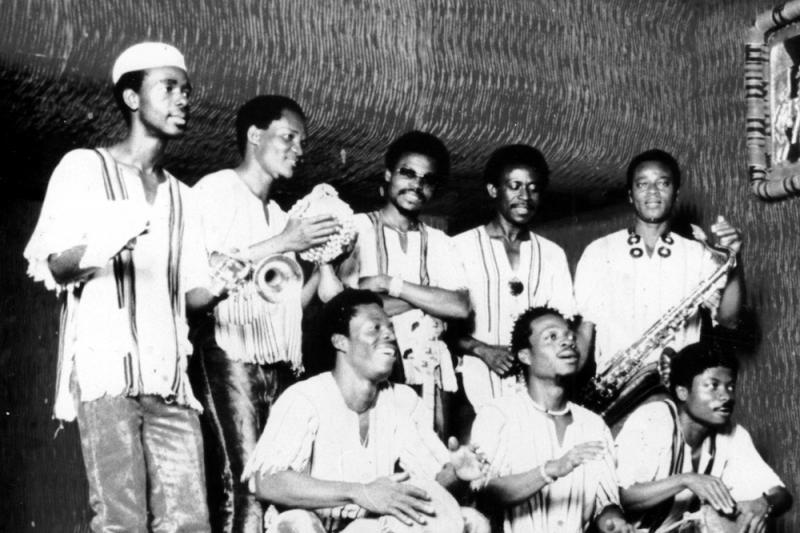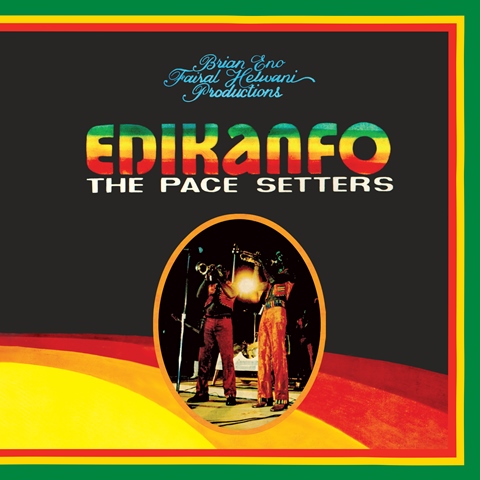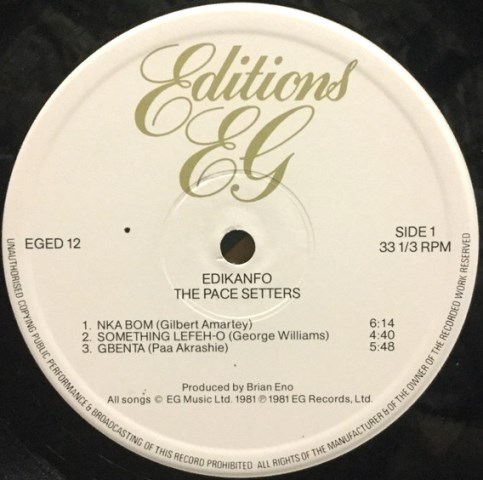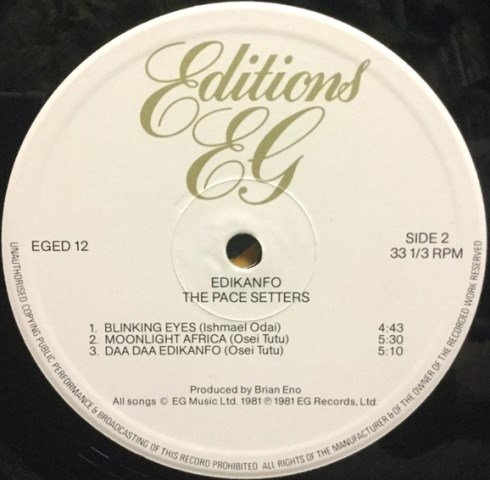Reissue CDs Weekly: Edikanfo - The Pace Setters | reviews, news & interviews
Reissue CDs Weekly: Edikanfo - The Pace Setters
Reissue CDs Weekly: Edikanfo - The Pace Setters
The reappearance of the Brian Eno-produced Ghanaian band’s sole album

Ghana was visited by two British musicians in the early Eighties. One was Mick Fleetwood, who recorded the Visitor album in Accra during January and February 1981. The other was Brian Eno, who came to the country in late 1980 to attend the National Festival of Arts and Culture (NAFAC).
In the reminiscence Eno contributes to the new reissue of The Pace Setters, he says “having spent the previous few years immersed in Fela Kuti's early albums and the previous few months stuck into John Miller Chernoff's book African Rhythm and African Sensibility, I was very keen to hear some African music in situ.”
 Eno’s enthusiasm for West African music had already found an outlet in July and August 1980 when he produced Talking Heads’ Remain in Light album, issued that October. Kuti’s 1973 Afrodisiac album was a big influence: an unissued-at-the-time track from the sessions was titled "Fela's Riff". As one may have fed into the other, it’s disappointing that in what he’s written Eno says nothing about Talking Heads or Remain in Light and how they relate to The Pace Setters.
Eno’s enthusiasm for West African music had already found an outlet in July and August 1980 when he produced Talking Heads’ Remain in Light album, issued that October. Kuti’s 1973 Afrodisiac album was a big influence: an unissued-at-the-time track from the sessions was titled "Fela's Riff". As one may have fed into the other, it’s disappointing that in what he’s written Eno says nothing about Talking Heads or Remain in Light and how they relate to The Pace Setters.
The Pace Setters was originally issued in 1981 by EG and its parent imprint Polydor (i.e. Eno’s label) in Canada, Italy, Japan, The Netherlands, the UK and US. It’s not an obscure or rare album, but until he worked with Uganda’s Paris-based Geoffrey Oryema in 1990 it was the only non-European, non-American record Eno had produced.
 This is is a straightforward album, melding highlife with a light funk. Bassist Gilbert Amartey Amar is quoted saying “from afrobeat there were records of influence. But we were mostly playing highlife. Our sound was very Ghanaian. And we were also playing jazz.” He also says “Disco music [was being played in the clubs]. And lots of reggae.”
This is is a straightforward album, melding highlife with a light funk. Bassist Gilbert Amartey Amar is quoted saying “from afrobeat there were records of influence. But we were mostly playing highlife. Our sound was very Ghanaian. And we were also playing jazz.” He also says “Disco music [was being played in the clubs]. And lots of reggae.”
Opening cut “Nka Bom” is an instant winner. It drives. The pace does not let up. A six-minute fusion of highlife and Lalo Schifrin/Streets of San Francisco dynamics, it brings a jazz-rock sensibility to West African music. It is the album’s highlight, though the similarly soundtrack-ish “Gbenta” is almost as good. The band were a six piece and the songs are individually written by five of the members, which explains the lack of a unified sound – exemplified by the melodic and moody “Moonlight Africa”, which is more about its soaring chorus than anything else. The only misfire is the wandering “Blinking Eyes”, the least dynamic cut.
 It's not possible to detect an Eno involvement in what's heard. He says “the actual recording sessions were joyful – the band played with such verve that you couldn't resist. What they’d given me was finished – there was nothing else I could add." Although nothing is said about it in the cursory liner notes, Edikanfo's producer must had a role in getting the band their record deal.
It's not possible to detect an Eno involvement in what's heard. He says “the actual recording sessions were joyful – the band played with such verve that you couldn't resist. What they’d given me was finished – there was nothing else I could add." Although nothing is said about it in the cursory liner notes, Edikanfo's producer must had a role in getting the band their record deal.
In Ghana, the mover behind Edikanfo was the ex-pat Lebanese entrepreneur Faisal Helwani, who formed the band in late 1979 from members of other outfits. He invited Eno to Ghana. Helwani had recorded E.T. Mensah and, in 1980, would discover Onipa Nua. He also ran Accra’s Napoleon Club, where Kuti played. Edikanfo was Helwani’s first brush with the European market, a venture curtailed by Jerry John Rawlings’ coup d’état of 31 December 1981. After this, Ghana’s culture was effectively cut off from the outside world. Edikanfo couldn’t capitalise on the release of their album.
A year earlier, Eno was in Ghana working with Edikanfo. He recalls "During my visit (which lasted about a month) I was staying in Faisal's house…Faisal was very generous with food – we had huge African meals each night – but I came to feel more and more like a prisoner since I wasn't allowed out without a bodyguard, and even then prevented from going very far.” Happily – in the short term – no such restrictions applied to Edikanfo’s The Pace Setters.
- Next Week: Them Belfast Gypsies – the Van Morrison-free Them spin-off band
- More reissue reviews on theartsdesk
- Kieron Tyler’s website
Explore topics
Share this article
The future of Arts Journalism
You can stop theartsdesk.com closing!
We urgently need financing to survive. Our fundraising drive has thus far raised £49,000 but we need to reach £100,000 or we will be forced to close. Please contribute here: https://gofund.me/c3f6033d
And if you can forward this information to anyone who might assist, we’d be grateful.

Subscribe to theartsdesk.com
Thank you for continuing to read our work on theartsdesk.com. For unlimited access to every article in its entirety, including our archive of more than 15,000 pieces, we're asking for £5 per month or £40 per year. We feel it's a very good deal, and hope you do too.
To take a subscription now simply click here.
And if you're looking for that extra gift for a friend or family member, why not treat them to a theartsdesk.com gift subscription?
more New music
 Solar Eyes, Hare & Hounds, Birmingham review - local lads lay down some new tunes for a home crowd
Psychedelic indie dance music marinated in swirling dry ice
Solar Eyes, Hare & Hounds, Birmingham review - local lads lay down some new tunes for a home crowd
Psychedelic indie dance music marinated in swirling dry ice
 The Lemonheads' 'Love Chant' is a fine return to form
Evan Dando finally gets back in the saddle with an album of new tunes
The Lemonheads' 'Love Chant' is a fine return to form
Evan Dando finally gets back in the saddle with an album of new tunes
 Music Reissues Weekly: Evie Sands - I Can’t Let Go
Diligent, treasure-packed tribute to one of Sixties’ America’s great vocal stylists
Music Reissues Weekly: Evie Sands - I Can’t Let Go
Diligent, treasure-packed tribute to one of Sixties’ America’s great vocal stylists
 'Deadbeat': Tame Impala's downbeat rave-inspired latest
Fifth album from Australian project grooves but falls flat
'Deadbeat': Tame Impala's downbeat rave-inspired latest
Fifth album from Australian project grooves but falls flat
 Heartbreak and soaring beauty on Chrissie Hynde & Pals' Duets Special
The great Pretender at her most romantic and on the form of her life
Heartbreak and soaring beauty on Chrissie Hynde & Pals' Duets Special
The great Pretender at her most romantic and on the form of her life
 The Last Dinner Party's 'From the Pyre' is as enjoyable as it is over-the-top
Musically sophisticated five-piece ramp up the excesses but remain contagiously pop
The Last Dinner Party's 'From the Pyre' is as enjoyable as it is over-the-top
Musically sophisticated five-piece ramp up the excesses but remain contagiously pop
 Moroccan Gnawa comes to Manhattan with 'Saha Gnawa'
Trance and tradition meet Afrofuturism in Manhattan
Moroccan Gnawa comes to Manhattan with 'Saha Gnawa'
Trance and tradition meet Afrofuturism in Manhattan
 Soulwax’s 'All Systems Are Lying' lays down some tasty yet gritty electro-pop
Belgian dancefloor veterans return to the fray with a dark, pop-orientated sound
Soulwax’s 'All Systems Are Lying' lays down some tasty yet gritty electro-pop
Belgian dancefloor veterans return to the fray with a dark, pop-orientated sound
 Music Reissues Weekly: Marc and the Mambas - Three Black Nights Of Little Black Bites
When Marc Almond took time out from Soft Cell
Music Reissues Weekly: Marc and the Mambas - Three Black Nights Of Little Black Bites
When Marc Almond took time out from Soft Cell
 Album: Mobb Deep - Infinite
A solid tribute to a legendary history
Album: Mobb Deep - Infinite
A solid tribute to a legendary history
 Album: Boz Scaggs - Detour
Smooth and soulful standards from an old pro
Album: Boz Scaggs - Detour
Smooth and soulful standards from an old pro
 Emily A. Sprague realises a Japanese dream on 'Cloud Time'
A set of live improvisations that drift in and out of real beauty
Emily A. Sprague realises a Japanese dream on 'Cloud Time'
A set of live improvisations that drift in and out of real beauty

Add comment